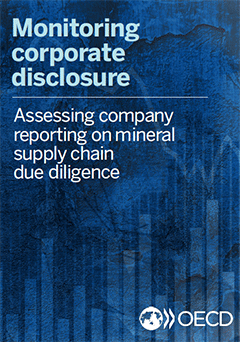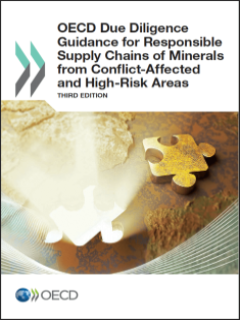Monitoring corporate disclosure - Assessing company reporting on mineral supply chain due diligence

|
With the expanding use of OECD RBC and due diligence standards as global benchmarks for the responsible trade in minerals, policymakers, stakeholders, and industry are looking for data to inform their decision-making on the topic.
The OECD has developed a Monitoring and Evaluation Framework (available also in Spanish) to improve the understanding of how due diligence is being implemented and if it is helping to achieve the aims of the OECD Minerals Guidance.
The Framework will generate meaningful data to make sense of the mechanisms by which due diligence leads to impacts, particularly in mineral producing countries and communities, and help stakeholders scale up what’s working and address what isn’t.
As uptake or adoption of due diligence practices is a key node along any impact pathway, the OECD regularly monitors and assesses corporate due diligence disclosures. This study provides a global snapshot of how companies report on due diligence by country, sector, supply chain segment and company characteristics like size and ownership structure.
The OECD Centre for Responsible Business Conduct is always looking for synergies with policymakers, industry and independent initiatives in addition to academics and researchers with innovative ideas on how to measure the uptake and impact of responsible sourcing.
Watch the launch event on replay | Regardez l'événement de lancement |
Published on 7 April 2022 |
|
The OECD Due Diligence Guidance for Responsible Mineral Supply Chains
The OECD Due Diligence Guidance for Responsible Supply Chains of Minerals from Conflict-Affected and High-Risk Areas clarifies how companies can identify and better manage risks throughout the entire mineral supply chain, from miners, local exporters and mineral processors to the manufacturing and brand-name companies that use these minerals in their products.
How does the Guidance apply to you? Visit our interactive platform
|
|
Related Documents



